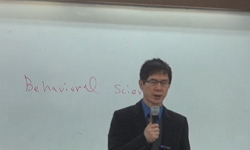Since Lakoff and Johnson (1980), metaphor has been considered to be conceptual.That is, the metaphor is not restricted to the rhetorics of literature but, as a main cognitive tool, is prevalent in many kinds of conceptualization domains, including ord...
http://chineseinput.net/에서 pinyin(병음)방식으로 중국어를 변환할 수 있습니다.
변환된 중국어를 복사하여 사용하시면 됩니다.
- 中文 을 입력하시려면 zhongwen을 입력하시고 space를누르시면됩니다.
- 北京 을 입력하시려면 beijing을 입력하시고 space를 누르시면 됩니다.

Food As a Source Domain of Metaphor in Korean and English = Food As a Source Domain of Metaphor in Korean and English
한글로보기https://www.riss.kr/link?id=A100530403
- 저자
- 발행기관
- 학술지명
- 권호사항
-
발행연도
2014
-
작성언어
Korean
- 주제어
-
등재정보
KCI등재
-
자료형태
학술저널
- 발행기관 URL
-
수록면
121-141(21쪽)
- 제공처
-
0
상세조회 -
0
다운로드
부가정보
다국어 초록 (Multilingual Abstract)
Since Lakoff and Johnson (1980), metaphor has been considered to be conceptual.That is, the metaphor is not restricted to the rhetorics of literature but, as a main cognitive tool, is prevalent in many kinds of conceptualization domains, including ordinary language. This understanding has led to the influx of discoveries of metaphors in everyday speech. These discoveries have focused on how a target concept is conceptualized using various source concepts. Cross-linguistic comparison have also been based on a target concept as in the comparison of ANGER and HAPPINESS metaphors in English and Chinese by Yu(1995). This paper, however, discovers and compares various metaphors related to a source concept, food, in Korean and English. It explains how different concepts are metaphorically understood as food concepts in the two languages. The result shows that the two languages share metaphors connecting the ``food`` concept with more abstract concepts such as humans, human temperament, lust, emotion, life, idea, information and knowledge, time, mood, etc.This commonality is explained by the universal bodily experience of food related concepts such as cooking, eating, tasting, and digesting. However, it also reveals that some of the metaphors are conceptualized differently in Korean and English, depending on which aspect of the source domain is highlighted.
동일학술지(권/호) 다른 논문
-
The Korean Dative Compared with German: A Grammaticalizational Approach
- 대한언어학회
- ( Kyung An Song )
- 2014
- KCI등재
-
A Corpus-based Study on Korean EFL Learners` Use of Resultive Conjuncyive Adverbials
- 대한언어학회
- ( Jee Woo Kim )
- 2014
- KCI등재
-
A Study on the Relationship Between Multiple Intelligence and Listening Proficiency for EFL Leafners
- 대한언어학회
- ( Sung Ran Koh )
- 2014
- KCI등재
-
- 대한언어학회
- 이희두 ( Hee Doo Lee )
- 2014
- KCI등재





 KISS
KISS






